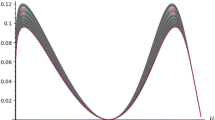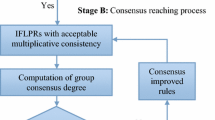Abstract
Compatibility analysis is an efficient and important tool used to measure the consensus of opinions within a given group of individuals. In this paper, we give a compatibility measure between intuitionistic preference values and a compatibility measure between intuitionistic preference relations, respectively, and study their properties. It is shown that each individual intuitionistic preference relation and the collective intuitionistic preference relation is perfectly compatible if and only if all the individual intuitionistic preference relations are perfectly compatible. Based on the compatibility measures, a consensus reaching procedure in group decision making with intuitionistic preference relations is developed, and a method for comparing intuitionistic fuzzy values is pointed out, by which the considered objects are ranked and selected. In addition, we extend the developed measures, procedure and method to accommodate group decision making situations with interval-valued intuitionistic preference relations. Numerical analysis on our results through an illustrative example is also carried out.
Similar content being viewed by others
References
Atanassov K (1986) Intuitionistic fuzzy sets. Fuzzy Sets Syst 20: 87–96
Fan ZP, Liu Y (2010) An approach to solve group decision making problems with ordinal interval numbers. IEEE Trans Syst Man Cybern Part B 40: 1413–1423
Herrera F, Herrera-Viedma E, Verdegay JL (1996) Direct approach processes in group decision making using linguistic OWA operators. Fuzzy Sets Syst 79: 175–190
Orlovsky SA (1978) Decision-making with a fuzzy preference relation. Fuzzy Sets Syst 1: 155–167
Saaty TL (1980) The analytic Hierarchy process. McGraw-Hill, New York
Saaty TL, Vargas LG (1987) Uncertainty and rank order in the analytic hierarchy process. Eur J Oper Res 32: 107–117
Szmidt E, Kacprzyk J (2002) Using intuitionistic fuzzy sets in group decision making. Control cybern 31: 1037–1053
Szmidt E, Kacprzyk J (2003) A consensus-reaching process under intuitionistic fuzzy preference relations. Int J Intell syst 18: 837–852
Szmidt E, Kacprzyk J (2004) A similarity measure for intuitionistic fuzzy sets and its application in supporting medical diagnostic reasoning. Lect Notes Artif Intell 3070: 388–393
Van Laarhoven PJM, Pedrycz W (1983) A fuzzy extension of Saaty’s priority theory. Fuzzy Sets Syst 11: 199–227
Xu ZS (2004) On compatibility of interval fuzzy preference relations. Fuzzy Optim Decis Mak 3: 217–225
Xu ZS (2005) Deviation measures of linguistic preference relations in group decision making. Omega 33: 249–254
Xu ZS (2007a) A survey of preference relations. Int J Gen Syst 36: 179–203
Xu ZS (2007b) Intuitionistic preference relations and their application in group decision making. Inf Sci 177: 2363–2379
Xu ZS (2007c) Intuitionistic fuzzy aggregation operators. IEEE Trans Fuzzy Syst 15: 1179–1187
Xu ZS, Cai XQ (2010) Recent advances in intuitionistic fuzzy information aggregation. Fuzzy Optim Decis Mak 9: 359–381
Xu ZS, Cai XQ (2011) Uncertain power average operators for aggregating interval fuzzy preference relations. Group Decis Negotiat. doi:10.1007/s10726-010-9213-7
Xu ZS, Cai XQ, Szmidt E (2011) Algorithms for estimating missing elements of incomplete intuitionistic preference relations. Int J Intell Syst 21: 787–813
Xu ZS, Chen J (2007) Approach to group decision making based on interval-valued intuitionistic judgment matrices. Syst Eng Theory Pract 27: 126–133
Xu ZS, Yager RR (2006) Some geometric aggregation operators based on intuitionistic fuzzy sets. Int J Gen Syst 35: 417–433
Xu ZS, Yager RR (2009) Intuitionistic and interval-valued intutionistic fuzzy preference relations and their measures of similarity for the evaluation of agreement within a group. Fuzzy Optim Decis Mak 8: 123–139
Yager RR (1988) On ordered weighted averaging aggregation operators in multicriteria decision making. IEEE Trans Syst Man Cybern 18: 183–190
Yager RR (1993) Families and extension of OWA aggregation. Fuzzy Sets Syst 59: 125–148
Author information
Authors and Affiliations
Corresponding author
Rights and permissions
About this article
Cite this article
Xu, Z. Compatibility Analysis of Intuitionistic Fuzzy Preference Relations in Group Decision Making. Group Decis Negot 22, 463–482 (2013). https://doi.org/10.1007/s10726-011-9278-y
Published:
Issue Date:
DOI: https://doi.org/10.1007/s10726-011-9278-y




